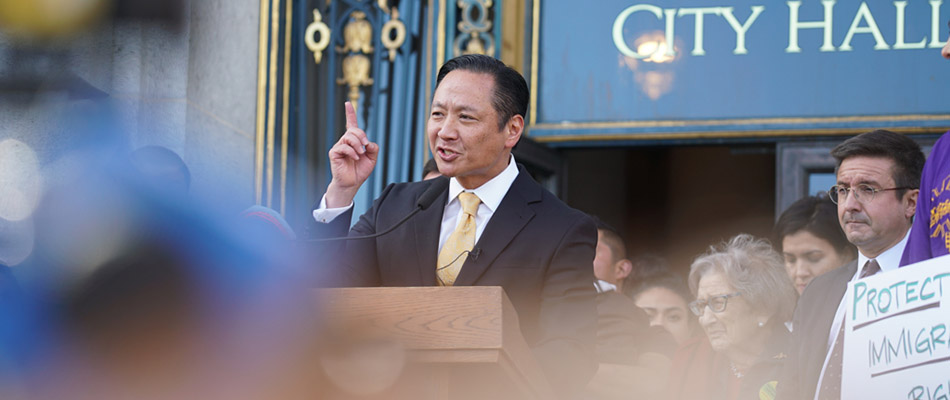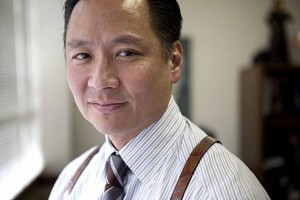
Jeff Adachi
Feds Dangle Possible Obstruction Case Over Journalist in Adachi Leak Probe
Why would police seize 15 computers, tablets and the journalist’s cellphone?
By Matthew Keys, May 18, 2019 5:16 am
A pair of federal agents reportedly told a journalist that he was at the center of a possible obstruction of justice case during a raid of the freelancer’s home earlier this month, according to court records.
Last week, Bryan Carmody told the California Globe officers from the San Francisco Police Department raided his home and an office used for his news gathering business in connection with an investigation over the leak of sensitive law enforcement records related to the death of former public defender Jeff Adachi.

Adachi died in February at the age of 59. His death was spurred by a lethal mixture of ethanol and cocaine, according to a medical examiner’s report; heart disease played a contributing factor in his death, the report said.
Shortly after Adachi died, Carmody began investigating the circumstances surrounding his passing, writing in a recent court affidavit that the untimely death of the public defender seemed “sudden and unexpected.” While gathering information on Adachi’s death, an unnamed individual provided Carmody with a 16-page police dossier with photographs and investigator’s reports that are typically considered to be law enforcement sensitive.
Last month, two San Francisco police officers visited his home and asked him for his source, Carmody wrote. In an interview with the California Globe, Carmody said one of the officers dangled the suggestion of a federal grand jury subpoena against the reporter as one way to compel him to reveal his source.
California law generally protects reporters and their sources from disclosure in police investigations and other government matters. That legal protection, known as a shield law, applies broadly throughout the state, but no similar law exists at the federal level.
On May 9, a San Francisco police officer obtained a search warrant to rummage through Carmody’s home, writing Carmody might be in possession of stolen property and other evidence connected to a felony crime. Carmody has not been formally accused of committing or charged with a crime as of Thursday morning.
One day later, a squadron of police officers raided Carmody’s home. Police seized dozens of items, including computer equipment, hard drives, compact discs, tablets, phones and camera equipment. As police rummaged through Carmody’s personal and professional belongings, a handcuffed Carmody was led into his home office by a pair of FBI agents for an impromptu interview, he said.
“During this time, the agents repeatedly asked me to reveal the name of my confidential source,” Carmody wrote in an affidavit filed in San Francisco Superior Court on Thursday. “I did not reveal the name of my source. They also asked me if I paid anything to receive the police report. I told them that I had paid nothing.”
Carmody said the agents informed him they were investigating a possible obstruction of justice case. Carmody wrote he provided “limited answers” to the agents but otherwise remained silent and repeatedly asked for a lawyer.
One agent reportedly offered to unlock Carmody’s phone so he could make a call, but the reporter said he declined the offer because he was handcuffed and didn’t want to give the agent the passcode to his phone.
On Thursday, a FBI spokesperson told Fox station KTVU (Channel 2) it was not a participant in the execution of the warrant on Carmody’s home, though the agency said two officials “were present in Mr. Carmody’s residence for approximately 10 minutes.” KTVU said it was one of the stations that “bought the police report from Carmody.”
The FBI did not say if agents were invited into the home by Carmody during the raid or if they merely took advantage of the situation to invite themselves in and conduct an impromptu interview.
Carmody’s affidavit was included as a supplement to a legal motion filed by Carmody’s lawyer Thomas Burke on Thursday. The motion sought to quash the search warrant of Carmody’s home and a second one executed on his office on the grounds they violated various California and federal laws, including the state’s shield law. It also demanded the immediate release of Carmody’s equipment valued at around $30,000.
The filing followed several attempts by Carmody and Burke to get the San Francisco Police Department to return the equipment seized on May 10.
Carmody, a veteran freelance journalist with decades of experience, operates North Bay Television News, a so-called “stringer” service that films and produces news stories for resale to mainstream media outlets. Carmody was recognized by the San Francisco Police Department as a member of the news media when the agency reissued a city-designated press pass to him earlier this year; a copy of the press pass was obtained by the California Globe along with other documents on Thursday.
In the affidavit filed on Thursday, Carmody wrote a lieutenant with the police department acknowledged his request along with a similar demand by his attorney for the return of items seized under the warrants. According to Carmody, the official said the agency was going through those items to determine which were relevant to its investigation.
The same day Carmody’s attorney filed the motion in court, San Francisco Police Chief William Scott publicly defended the raid on the reporter’s home and office, saying he was “confident” his department “took the appropriate legal matters to get the search [warrant] authorized by the [judges] that looked at it.”
“This leak was a breach of the public’s trust and we understand that and we’re investigating these allegations fully, including allegations of misconduct potentially by members of the San Francisco Police Department,” Scott said.
- Assemblywoman Jacqui Irwin Proposes Law to Authorize Withholding Autopsy Reports From Public Disclosure - February 28, 2020
- As AG Becerra Seeks Federal Recognition of Consumer Privacy Law, Companies Ask for Relief - February 26, 2020
- New Legislation Would Carve Out Additional Exemptions for Information from California Open Records Laws - February 24, 2020


Big government at it’s finest……